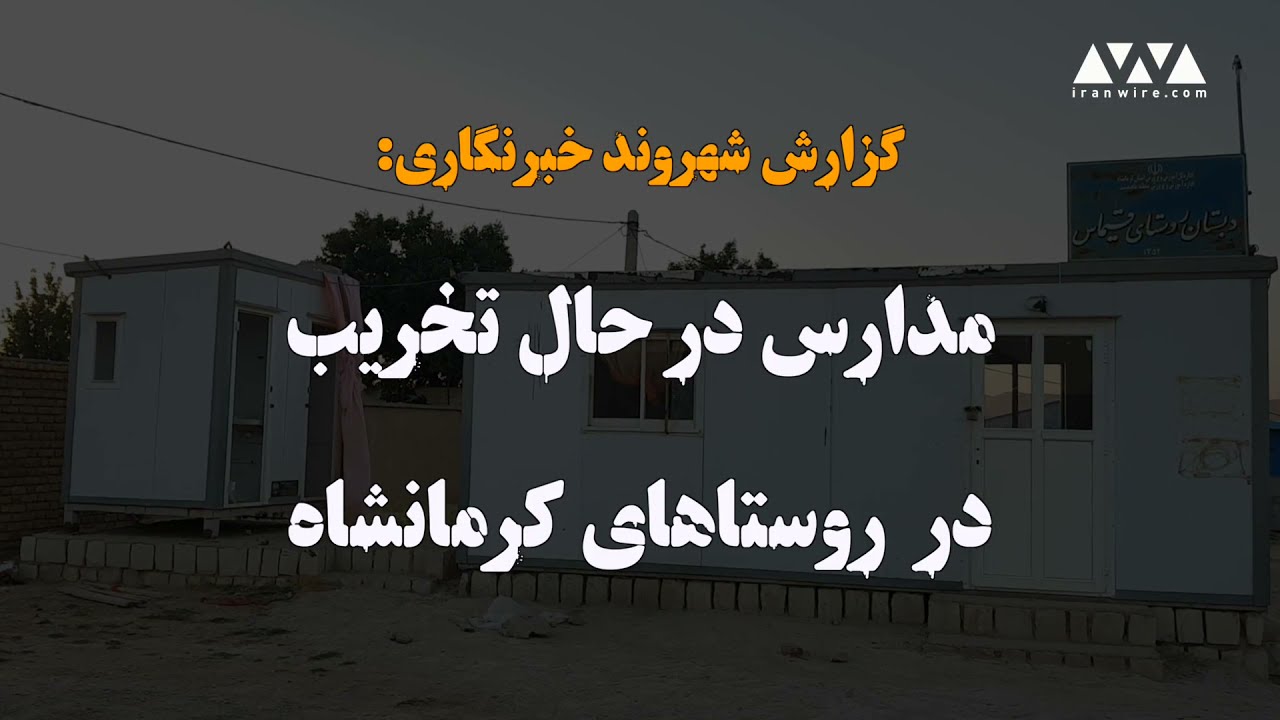A citizen journalist has sent a dispatch to IranWire lamenting the state of public facilities in Kermanshah County. Of these, the ramshackle, temporary school structures and lack of permanent education sites were seen by locals as the biggest issue.
In one of the county’s villages, after talking to pupils and their parents at one such structure, she wrote: “What I saw was unbelievable: a temporary school without any facilities, teachers who are addicts, and students who are being beaten."
The following is her report of what she encountered there.
This is the village of Gheymas, one of the villages of Mahidasht district in Kermanshah County, with a population of about 200 people and not even the barest of rural facilities. There is no piped natural gas, and no safe drinking water.
The school, too, is in a dilapidated state. It has just two teachers – one of whom, according to the students themselves, is a drug addict who beats them on various pretexts.
“We have to buy pens, whiteboards, desks, and everything ourselves," says the mother of one of the students. "We have to pay to repair the school. Last year, the manager here asked us to pay for plastering and to buy curtains; but when she left, she took it all.
“Once the oil heater caught fire. Now they have electric heaters, but when the children come home they are shivering from the cold. They charge us for the fuel. The manager also removed the curtains and lamps, which we had bought ourselves.”
The school only goes up to grade six, after which the children must travel to a different village to continue their education. Kowsar, a sixth-grader, tells me he no longer wants to continue because of how badly he was treated by the teacher here.
“Everyone said he was an addict,” he says. “Our classmates heard him call his friend to bring him stuff. I haven’t learned anything in sixth grade, and my parents won’t allow me to go to high school either because I’d have to go on public transport.”
Zahra and Reyhaneh are also enrolled at this school. "Our hands become red from the beating,” one of them says. “They hit on our hands and when we tell our parents, they say we should be beaten!"
When I ask one of the children’s mothers about violence by the teacher, she simply said: "Well, the child has to be beaten to grow. They must have not studied well, hence they are being beaten."
But her daughter responds immediately: "No, I studied for my lessons very well. He is a bad teacher and he locks us in the classroom while smoking secretly. They even force us to wash and clean the school toilet."
The temporary shelter school in Gheymas is shared between youngsters from two neighboring villages. About 40 girls and boys study here. It looks more like a barn than a school, and the situation inside is deplorable; the toilets are very dirty and without taps, and there is nothing in the classrooms but a few old benches. A large photo of the Supreme Leader of the Islamic Republic is fixed to the wall.
The girls at on one of the benches and tell their stories. “I was sitting next to this heater,” one of them says, “when it suddenly collapsed and dirt and smoke fell on my head, and the children ran away.
“The heater is old and perforated. If we don’t bring fuel, the teacher will hit us with a hose. One day he called everyone and told us that if we told the office he is addicted, he will kill us. Then he asked Hadis, why did she tell others that he was an addict? Then he hit on her hand with a hose!
“He took 100,000 tomans from us to buy a window pane for the class, but he didn’t buy it. He tells us to clean the room; his desk is covered with cigarette filters. When we dump his garbage, our hands smell like cigarettes.
“In winter, when it rains, the classroom gets wet and water comes in. Water comes from the window and it gets cold, and it hurts. We arrive at eight o'clock in the morning and turn on the heater at 10 o'clock.”
After this miserable encounter, I move on to discover the situation is the same in the other villages. From the villages of Kol Kesh and Mort Sabz, to the suburbs of Gilan-e Gharb, to the villages of Kanishah Gholi, and the outskirts of the cities of Songhor and Firouzabad in Kermanshah, everyone suffers from the same lack of facilities. The schools are in a state. Many of the teachers are abusive, and the lack of sufficient classes is acute – that is, where there are classrooms at all.
This report was written by a citizen journalist in Kermanshah County under a pseudonym.
visit the accountability section
In this section of Iran Wire, you can contact the officials and launch your campaign for various problems

























comments